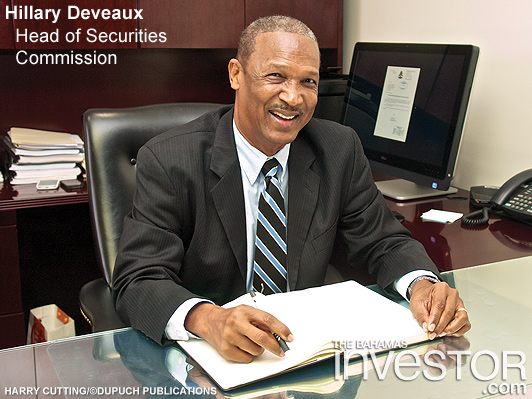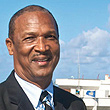| Published: Date: Updated: Author: |
The Bahamas Investor Magazine January 21, 2014 January 21, 2014 Tosheena Robinson-Blair |
He knows the ins and out of the Securities Commission of The Bahamas, arguably, better than anyone else, having watched the institution take shape from the ground up. Hillary Deveaux is temporarily back at the helm of the entity charged with ensuring the integrity of the capital markets and the Bahamas International Securities Exchange (BISX).
In the months to come, he hopes to beef-up investor education, protect the jurisdiction’s reputation and help hand-pick a suitable successor.
Credited with having “extensive” experience in the capital markets coupled with “broad and deep” knowledge of the securities industry, Deveaux is no newcomer to the commission having worked there during the organization’s embryonic stage, when it functioned as a board.
Returning to the post after serving as the Capital Markets Development Advisor to the International Monetary Fund’s Caribbean Regional Technical Assistance Centre (CARTAC), Deveaux had worked at the Commission for 13 years, coming onboard June 1, 1997, as secretary to the Securities Board–the predecessor to the Securities Commission.
“There were six employees when I got here and we occupied a very small portion of this floor,” he says, referencing the commission’s third floor headquarters in Charlotte House on Shirley and Charlotte streets in downtown Nassau. “Today we have about 65 employees and we occupy about three quarters of the space on the floor.” The remaining space is occupied by the Insurance Commission of The Bahamas.
Regulated turf
Promulgated in 1995, the Securities Board Act gave the commission general powers to regulate and supervise the securities market.
Later that year the Mutual Funds Act was put in force creating specific powers for the commission to regulate the mutual funds industry.
Initially, there was no stock exchange to police. In a deliberate move, BISX was not incorporated until September 1999. Policymakers wanted to ensure that effective legislative framework was first in place.
In the mid-1990s, the capital markets were not regulated effectively since general powers provided the newly minted commission with more bark than bite. “Having general powers didn’t really provide you with much to enforce the laws,” Deveaux admits.
In 1999, the Securities Industries Act was passed, providing the commission with specific powers to regulate the securities market. However, problems persisted with the Mutual Funds Act.
“It was drafted by the industry and it pretty much exempted most of the funds from regulations that were administered by banks and trust companies,” Deveaux explains.
In 2003, the government repealed the Mutual Funds Act replacing it with the Investment Funds Act, which provided specific powers to deal with the mutual and investment funds industry.
The year before the government repealed the legislation Deveaux was appointed acting executive director of the commission. He was confirmed in the top post almost four years later on May 16, 2006.
It was a position he held until August 2010. In December 2011, the government repealed the 1999 Securities Industry Act, replacing it with the Securities Industry Act, 2011. “The new legislation is not only good for business, but is good for the reputation of the jurisdiction,” says Deveaux.
One particular feature of the new legislation removes the meat from the law and places it into the regulation. Consequently, the commission doesn’t have to continuously seek out parliamentary approval for certain regulatory changes. Rather, the securities industry regulator would need only ministerial approval from the Minister of Finance.
“In most cases regulators are usually one step behind the industry. The industry is so innovative and so dynamic that regulators have to catch up,” says Deveaux. “This is one of the reasons why it’s important to have most of the regulatory issues included in the regulations so you could adapt or adjust very quickly to changes in the industry.”
Another new legislative feature is enforcement. The commission now has the ability to freeze assets.
“The Securities Industry Act [2011] was primarily developed to deal with a lot of the deficiencies in the legislation with regards to international best practices and also designed to ensure that we complied with the conditions associated with the International Organization of Securities Commissions (IOSCO) Multilateral Memorandum of Understanding (MMoU),” says Deveaux.
The Bahamas had been granted Status B signatory to IOSCO’s MMoU in June 2009, under Deveaux’s watch. Status B signals a jurisdiction’s voluntary commitment to implement the legal framework necessary to be in compliance with IOSCO’s global agreement concerning the consultation, cooperation and the exchange of information between securities regulators around the world.
The Bahamas gained Status A in January 2013 and officially signed the document in September in Luxembourg.
“From a Securities Industry Act perspective we have been pretty much compliant with international best practices,” says Deveaux. “Becoming a signatory has provided greater cooperation between the Securities Commission and its sister regulators around the world, so you don’t have a situation where people are using intermediaries in The Bahamas to evade regulatory issues in their own jurisdiction.”
Regarding investment funds, the Securities Commission and other industry stakeholders are taking a second look at the Investment Funds Act. “We are looking at that legislation with the view of either making some substantial amendments to the act or repealing it and replacing it with new legislation,” Deveaux says.
Investor education
Unlike the last time he served as interim executive director, Deveaux expects to be in this position for a matter of months, not years. He received his appointment on September 11, 2013, following the departure of Dave Smith, who held the post for a little over a year.
Although Deveaux is responsible for the day-to-day running of the commission’s operations, he has one major responsibility that most executive directors don’t have: to assist the 10-strong board and the minister in identifying a short-list of persons who could fill the position of executive director. “I expect to stay on until a new executive director is fully in place,” he says. In the meantime, Deveaux has at least one pet project he would like to see get off the ground.
“One of my personal interests is in investor education.” Nationally, only a small percentage of Bahamians invest in stocks and bonds. Deveaux hopes to reintroduce a vibrant investor education programme. As Deveaux puts it, the local capital market is “a fledgling concept” for investors and even CEOs who might one day take their private held companies public.
“For people who may need to raise capital, like the closely held companies, it might be more beneficial for them to hold 50 per cent of the shares of the company and generate higher profits than holding 100 per cent of the company and generating lower profits. It’s important for us to get the message out there and really encourage companies to go public and create a larger capital market in this jurisdiction,” says Deveaux.
“The investing public is not savvy to investment instruments. I think it’s important to make them understand exactly what kind of financial instruments are available, the risk associated with those and how they can benefit.”
At press time there were 29 companies listed on BISX, with a market cap of just under $3 billion. Like stock markets elsewhere, BISX took a hit during the recession. In 2007, it had a market cap of almost $4 billion, with 19 listed companies.
Still, that is offset somewhat by major growth in the investment fund area, more specifically in the area of SMART Funds–risk-adjusted, low-cost, investment structures. Recently, the Securities Commission approved a SMART Fund model 007 designed specifically for the Brazilian market. “These are great times for The Bahamas as a financial services centre,” says Deveaux. “We are seeing greater cooperation between the regulators, the jurisdiction’s promoters and the industry’s participants.”










